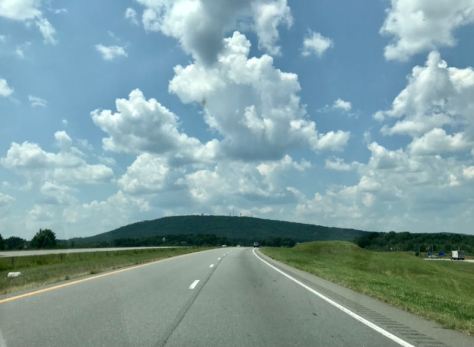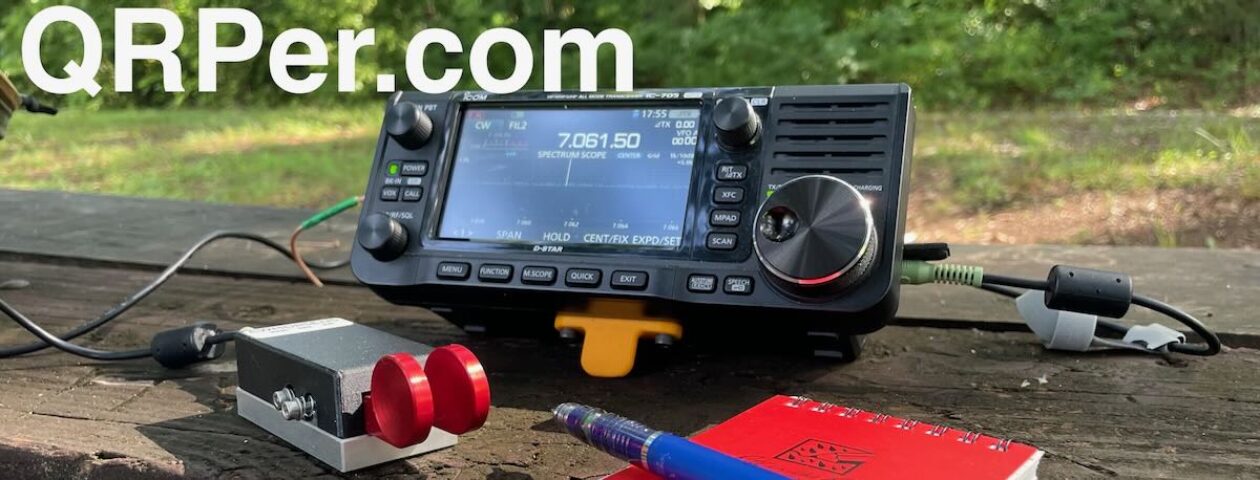 As AA6XA wrote on his blog:
As AA6XA wrote on his blog:
To quote the W4C association manager Pat, KI4SVM, “Anderson is a drive-up with no other redeeming qualities.” This perfectly describes the mountain. It is easy to get to, at the top of Tower Road, right off of Route 16. The road to the top get a bit rough in places, but is passable in any car.
He had me at “no other redeeming qualities”–!
I must admit that all of the summits I’ve activated so far have been pretty amazing: offering up spectacular views, wildlife, and wonderful hiking opportunities. All of them were also on protected public lands like state/national/county parks.
Anderson Mountain (W4C/WP-012)
Earlier this year, I made a spreadsheet of summits I planned to activate. Anderson Mountain was one of them because of its convenient location in my travels to visit family each week. I had also been saving it for the day that I planned to activate a nearby park–Tuesday, July 6, 2021 was that day!
Earlier, I had an amazing activation at Mountain Island Educational State Forest using the Yaesu FT-817ND, T1, and my speaker wire antenna. I completed Mountain Island in enough time I could also pop by Anderson Mountain for a quick activation. It was literally a six minute detour from my route, if that.
The mountain is directly off of US 16–the main highway between Newton/Conover and Charlotte.
You turn off of the highway onto a dead end road that leads to the summit. About halfway up, it turns into a single lane privately-maintained road that, as AA6XA noted above, is rough but passable in any car (well, save a Lamborghini but I’m guessing most SOTA ops don’t own one of those!).
The road to the summit is a straight–there’re no confusing forks in the road and it’s impossible to get lost.
Once on top, you’re greeted by a few clusters of communications towers. This is actually pretty common sight with smaller one point summits because they typically have superb line-of-sight to populated areas and are easily accessible by vehicle.
When you look around, you can understand why Pat would say it has no redeeming qualities: towers, rusty transmitter buildings, razor wire on chain link fences, and litter all over the place.
Not the sort of spot that would inspire Ansel Adams.
Judgement call
It’s worth noting here that, unlike POTA, you’re not allowed to operate from a vehicle during a SOTA activation–even at a “drive-up” summit. There’s no such thing as a mobile SOTA activation.
Indeed, you’re not supposed to operate in “the vicinity” of your vehicle either (although, there’s no distance noted and I’m guessing this is on purpose to allow leeway and the op to make a judgement call).
I set up in a little island of trees in the middle of a road loop on the summit. While I wouldn’t call it a hike, I did walk the entire summit after arriving to check for other operating spots, but decided to set up near where I parked the car. In fact, it’s really the only safe spot I noted in the activation zone to park since the road is single lane and you would otherwise block access to one of the transmitter sites. I thought about parking further down the road next to one of the transmitter fences, but I felt like that would have been on private property.
Side note: SOTA forbids operators from trespassing on private property without the owner’s permission. I checked the road very carefully for “no trespassing” signs, but the only ones I found were to keep people out of and away from the fenced-in transmitter sites.
I also thought about trying to operate in a spot on that little island where I couldn’t see my car as easily in the cluster of trees–to remove myself from the “vicinity” of the car–but that would have been awkward, too and only separated me an additional 10-15 meters or so. I chose the option where others could see me and I could see them if, for example, a Duke Energy service vehicle approached.
I was fully outside of my car, though, and not using it to support my antenna or any equipment–another important factor.
Sometimes as an operator you have to make a judgement call when you arrive at a site to stay within the rules and the spirit of the program. I’ve never had a SOTA or POTA activation where I felt I was splitting hairs until this one. I decided that this was the best scenario to activate Anderson Mountain in a way that wouldn’t inconvenience other property owners, nor cause suspicion that might lead to a future no trespassing sign on the road. It was the safest set up and I’m willing to bet most previous activators did exactly the same thing. I felt it was within the spirit of the program.
Now where was I–? Oh yes…
Gear:
- Elecraft KX2
- 28.5 foot speaker wire antenna using one BNC Binding Post Adapter (affiliate link)
- GoRuck GR1 USA
- Weaver arborist throw line/weight and storage bag (affiliate links)
- Rite In The Rain Weatherproof Cover/Pouch (affiliate link)
- Jovitec 2.0 mm Mechanical Pencil (affiliate link)
- Muji A6 Notepad (affiliate link)
On The Air
Since I used the speaker wire antenna at Mountain Island, I used it on Anderson Mountain as well. I deployed the entire station within 5 minutes max: herein lies the advantage of using an arborist throw line, a shack-in-a-box transceiver like the KX2, and a simple wire antenna.
I first hopped on 20 meters CW, spotted myself to the SOTA network (mobile phone reception was superb, by the way) and started calling CQ SOTA.
Within three minutes I logged K6YK, KT5X, W5GDW, and K0LAF which already validated this SOTA activation.
Wow–validating this activation was, as my daughters used to say, “easy peasy lemon squeezy.”
I added WB6POT and N0RZ for a total of six stations on 20 meters within five minutes.
I then moved to 40 meters SSB and worked K8RAT, W4NA, and WN4AT all within about three minutes.
Finally, I moved up to the 17 meter band and worked F4WBN (our well-known French SOTA chaser) and K2LT.
Packing up my gear was as quick as setting it up.
Video
I did make one of my real-time, real-life videos of the entire Anderson Mountain activation with no edits. If you need a cure for insomnia, I encourage you to watch or listen to it:
At least one redeeming quality…
I mention in the video that some readers and subscribers have confessed that they feel SOTA is less accessible to them than POTA or WWFF. I would have to agree that summit activations are much less accessible than park activations.
For one thing, there are flat regions on our planet that lack prominences that qualify for the SOTA program. If you live in the middle of a prairie state, you may have to drive a great distance to reach the closest qualifying summit (although you might have a number of POTA and WWFF parks nearby).
In addition, summit activating generally involves hiking–which is actually the motivating factor for many of us (certainly for me as I love hiking).
Some would-be SOTA activators have mobility issues, however, and simply can’t hike great distances with gear on their backs.
This is where “drive-up” summits like Anderson Mountain come in: they’re much more accessible for those with health considerations.
If you live in an area with SOTA summits, but haven’t attempted an activation because you can’t do strenuous hikes, connect with local SOTA activators and ask for a list of “drive-up” summits. There are many of these around–some, like Anderson, are accessible because there are radio towers on top, other are accessible because they’re on a park with accessible vistas, or some are even in a mountaintop neighborhood.
Thank you
I’d like to thank all of you for reading this field report and I’d especially like to thank those of you who contribute to QRPer.com via Patreon and our Coffee Fund. While my content will always be free and QRPer is very much a labor of love, your support helps me purchase gear and supports my radio travels. With that said, if you’re saving up for your first radio or need to invest in your own kit, I’d rather you support yourself!
My goal with QRPer is to champion field radio operations and encourage others to discover the benefits of playing radio outdoors!
73,
Thomas (K4SWL)
Do you enjoy QRPer.com?
Please consider supporting us via Patreon or our Coffee Fund!
Your support makes articles like this one possible. Thank you!









